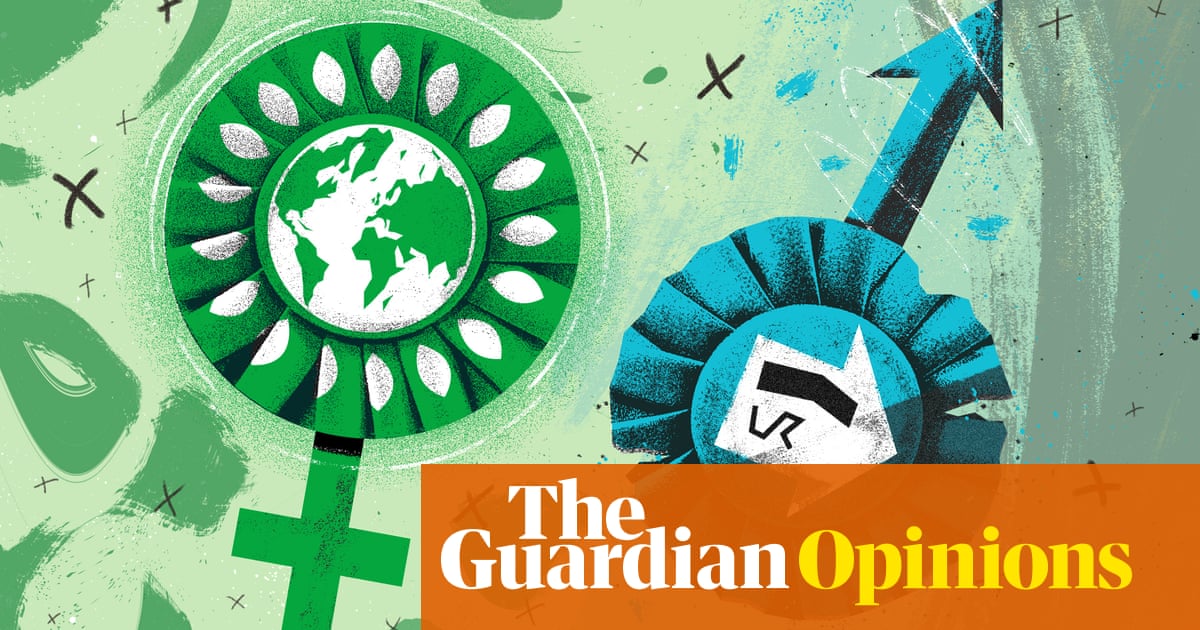Sometimes a political backlash doesn’t take the shape you expect. Though there are times when it goes off like a firework, as young men’sTikTok-fuelled surgeof enthusiasm for Nigel Farage did last summer, sometimes it’s more of a long, slow burn. The most underexplored form of revolt against mainstream politics right now is the second kind, involving not angry young men lurching rightwards but anxious young women turning, if anything, more sharply left.
Almost a quarter of women aged 18 to 24voted Green last July, roughly double the number of young men who voted Reform, though predictably it’s the latter who have since got all the attention. While the big parties chased avidly after so-calledWaitrose women, well-heeled home counties matrons considering defecting from the Tories, they had little to say to their daughters. So it was the Greens who ended up cornering the market in a certain kind of frustrated gen Z voter: typically a middle-class student or graduate in her early 20s, whose conscience is pricked every time she opens Instagram by heartrending images of orphans in Gaza or refugees drowning in the Channel, and who can’t understand why nobody seems to care. She’s angry about the rampant misogyny of some boys she knew at school, Donald Trump, greedy landlords and a burning planet, and the Greens’ more-in-sorrow-than-in-anger social media posts attacking Keir Starmer for choosing welfare cuts over wealth taxes strike a chord.
But deeper down, perhaps, she’s angry that despite slogging diligently through school and university and possibly a master’s (the Greens do best among the highly educated) she still can’t count on a lifestyle like her parents had. For all the girls who put their heads down and worked at school while the boys kicked off and absorbed all the teachers’ attention, there may be something grimly familiar about a Labour party that seemingly takes them for granted while bending over backwards to placate noisy Reform voters.
Why isn’t this quiet form of female political alienation ringing more alarm bells?
The obvious answer is that there aren’t enough of these young women to swing an election, but young Reform-voting men caught the public imagination despite being an even smaller drop in the electoral ocean. And though it would be dangerous to get complacent, detailed research on so-called “Reform-curious” voters to be published next week by the thinktank Persuasion counters some of the wilder assumptions about gen Z men’s politics, finding that while it’s true they are more likely than older male voters to think favourably of Farage, they’re less likely to actually vote Reform. Strikingly, they’re also less likely than middle-aged gen X men now to say that feminism has gone too far. Maybe it’s not just schoolboys who should be sat down andmade to watch Netflix’s Adolescence, as MPs keep arguing,but their fathers. The growing consensus meanwhile among political scientists is that if young men’s and women’s worldviews are (as polls suggest) becoming ever morestarkly polarised, the driving force behind that split is women becoming sharply more liberal, not men becoming radically more rightwing.
Rosie Campbell, professor of politics at King’s College London, is one of surprisingly few academics to have dug deeper into younger women’s political choices. For a start, it looks as if earlier waves of feminism have been the left’s unexpected recruiting sergeant: the historic trend is for women to become more liberal as more of them go to university or move into the labour market, and 57% of British university studentsare now female. But Campbell’s hunch is that young women’s radicalisation also has a lot to do with Brexit and its unfolding consequences. Women are noticeably more anti-austerity and pro-remain than men, she points out, which suggests they’re likely to have found the past nine years more frustrating.
As the two biggest parties fell over themselves to embrace Brexit and then to rule out big wealth taxes, these women are likely to have been pushed further and further out to the political fringes. Alongside her colleague Rosalind Shorrocks, Campbell traces the start of the Green surge back to a pool of young female voters attracted by Jeremy Corbyn’s promise of a “kinder, gentler politics”, who backed Labour in 2017 and then voted Green in the following set of European elections, and are unlikely now to be enthused by Starmer explaining why he no longer believes trans women are women. The final piece of the jigsaw, she suspects, may be social media: are the same algorithms blamed for leading young men down rightwing rabbit holes similarly reinforcing young women’s anger at social injustices, by feeding them an endless diet of the content they seem to click on most? If so, the gap between gen Z men and women is likely to grow, with consequences not just for politics but for the lives they may end up living alongside each other.
Perhaps there will never be enough of them to count electorally. Or perhaps their furious idealism will simply fade with age. But the failure even to be curious about what it is young women are trying to say, just because their chosen revolt against the mainstream takes a less aggressive or destructive form than young Reformers’, feels profoundly unfair. Sometimes it pays to listen to people sitting quietly at the back, not just the ones screaming in your face.
Gaby Hinsliff is a Guardian columnist
